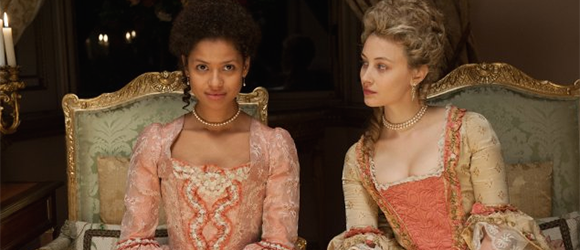Diversity Makes Belle a Beauty of a Movie, Not a Beast
Review

I have a confession to make: I have a weakness for costume dramas. I like indie sci-fi movies where people yell and shoot things, sure, but I also have a soft spot for movies where people wear ball gowns and pantaloons and make outrageously overwrought love confessions while standing in the rain. Jane Austen adaptations. North & South. They’re my cinematic comfort food. So you can be damn sure I was probably going to catch Belle eventually, regardless of its specific subject matter.
But the fact that it’s about an 18th century illegitimated mixed-race aristocrat? And it’s based on a true story? And it’s directed by a woman of color? Drama, pretty dresses, and diversity? Opening weekend: I’m there. And I was not disappointed.
Belle is the story of Dido Elizabeth Belle Lindsay (Gugu Mbatha-Raw), the child of a black woman and a white Navy Admiral (Matthew Goode) who after the death of her mother is taken in by her father’s uncle and aunt. Though her adoptive parents love her every bit as much as they do the other niece they took in (Sarah Gadon, whose character is basically Lotte from The Princess and the Frog, and it’s wonderful), societal pressures mean that they nevertheless treat her differently. She’s not allowed to dine with her family when guests are present, for example, because having her there would break all sorts of taboos. Compounding the family drama this creates is that Belle’s uncle (Tom Wilkinson), who just so happens to be Britain’s chief justice, is ruling on a court case integral to the future of Britain’s slave trade. Filling the hunky love interest role required of any British costume drama is John Davinier (Sam Reid), a poor wannabe lawyer/abolitionist who serves as a kindred spirit for Belle as her nascent political beliefs develop.
Belle is directed and written by Amma Asante and Misan Sagay, respectively, both women of color. I’m not saying a white man couldn’t have made a costume drama that explicitly tackles racism and sexism the way Belle does. But I am saying I don’t see that movie. This, ladies and gentlemen, is why it’s important to have diversity behind the camera as well as in front of it.
At multiple points Belle directly compares Belle’s situation as a wealthy black woman to the struggles of her cousin Elizabeth, who lacks Belle’s financial independence because of her dirtbag father and therefore absolutely has to find a husband. And yes, the movie acknowledges that Belle and particularly Elizabeth far exceed most women of color in terms of privilege. For all that Belle is inclusive, it’s still a movie about the aristocracy. There are still fancy houses and fancy parties. You still never actually see any of the slaves whose future is being deliberated on. Which I don’t mean as a criticism, because Belle is what it is, and what is it is “a Jane Austen movie, but with diversity and messages about how racism is bad and people should stand up against it.”
And that’s such an important movie to exist, not least because it directly challenges the common cinematic depiction of British history as lily white, as if among all the Elizabeth Bennet-types who actually existed in the real world there weren’t also people of color. How many British costume dramas even acknowledge how the British economy—and thus the prosperity of all those fictional rich white folks—relied on the slave trade for so many years? How often is history whitewashed? Scrubbed of uncomfortable truths? How many powerful, meaningful stories are left in obscurity because of that?
Aside from the social issues it presents, Belle is just an entertaining movie. The performances are quality all around, particularly from Mbatha-Raw and Penelope Wilton, who plays the governess/spinster aunt who’s a bit more progressive than she lets on at first. I feel a bit bad for poor typecast Tom Felton, who plays an overly racist jackass whose jackassery serves to illuminate the more subtle racism of another character. That dude’s never going to escape the dread spectre of Draco Malfoy, is he? I want him and Game of Thrones‘ Jack Gleeson to do a mockumentary reality show together.
Belle has all the hallmarks of its genre. Characters find true love. Family relationships are challenged and then mended. The villains get their comeuppance and exit stage left. If you want a brutally honest, take-no-prisoners look at historical racism you’d be better served with 12 Years a Slave. But if you want a costume drama with bonus diversity, say bonjour to Belle.
Are you following The Mary Sue on Twitter, Facebook, Tumblr, Pinterest, & Google +?
Have a tip we should know? tips@themarysue.com